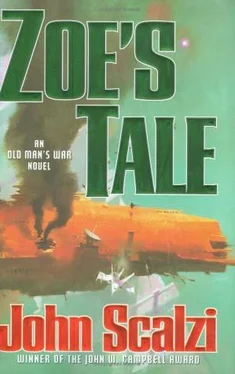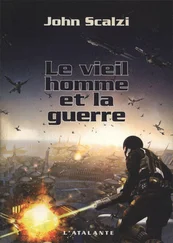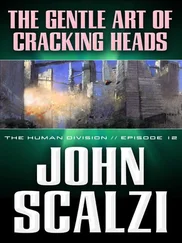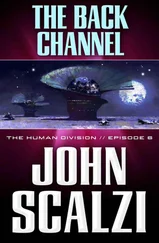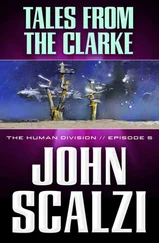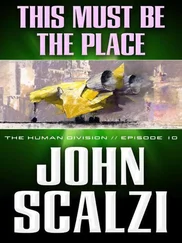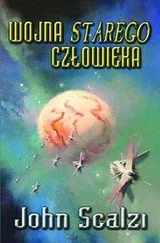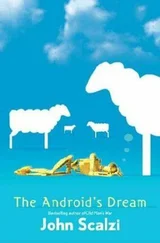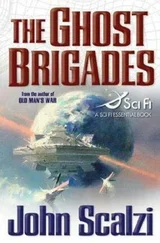Love you.
Enzo.
I love you, too, Enzo. I love you.
I miss you.
The next morning I found out Dad was under arrest.
"It's not exactly arrest," Dad said at our kitchen table, having his morning coffee. "I've been relieved of my position as colony leader and have to travel back to Phoenix Station for an inquiry. So it's more like a trial. And if that goes badly then I'll be arrested."
"Is it going to go badly?" I asked.
"Probably," Dad said. "They don't usually have an inquiry if they don't know how it's going to turn out, and if it was going to turn out well, they wouldn't bother to have it." He sipped his coffee.
"What did you do?" I asked. I had my own coffee, loaded up with cream and sugar, which was sitting ignored in front of me. I was still in shock about Enzo, and this really wasn't helping.
"I tried to talk General Gau out of walking into the trap we set for him and his fleet," Dad said. "When we met I asked him not to call his fleet. Begged him not to, actually. It was against my orders. I was told to engage in 'nonessential conversation' with him. As if you can have nonessential conversation with someone who is planning to take over your colony, and whose entire fleet you're about to blow up."
"Why did you do it?" I asked. "Why did you try to give General Gau an out?"
"I don't know," Dad said. "Probably because I didn't want the blood of all those crews on my hands."
"You weren't the one who set off the bombs," I said.
"I don't think that matters, do you?" Dad said. He set down his cup. "I was still part of the plan. I was still an active participant. I still bear some responsibility. I wanted to know that at the very least I tried in some small way to avoid so much bloodshed. I guess I was just hoping there might be a way to do things other than the way that ends up with everyone getting killed."
I got up out of my chair and gave my dad a big hug. He took it, and then looked at me, a little surprised, when I sat back down. "Thank you," he said. "I'd like to know what that was about."
"It was me being happy that we think alike," I said. "I can tell we're related, even if it's not biologically."
"I don't think anyone would doubt we think alike, dear," Dad said. "Although given that I'm about to get royally shafted by the Colonial Union, I'm not sure it's such a good thing for you."
"I think it is," I said.
"And biology or not, I think we're both smart enough to figure out that things are not going well for anyone," Dad said. "This is a real big mess, nor are we out of it."
"Amen," I said.
"How are you, sweetheart?" Dad asked. "Are you going to be okay?"
I opened my mouth to say something and closed it again. "I think right now I want to talk about anything else in the world besides how I'm doing," I said, finally.
"All right," Dad said. He started talking about himself then, not because he was an egotist but because he knew listening to him would help me take my mind off my own worries. I listened to him talk on without worrying too much about what he said.
* * *
Dad left on the supply ship San Joaquin the next day, with Manfred Trujillo and a couple other colonists who were going as representatives of Roanoke, on political and cultural business. That was their cover, anyway. What they were really doing, or so Jane had told me, was trying to find out anything about what was going on in the universe involving Roanoke and who had attacked us. It would take a week for Dad and the others to reach Phoenix Station; they'd spend a day or so there and then it would take another week for them to return. Which is to say, it'd take another week for everyone but Dad to return; if Dad's inquiry went against him, he wouldn't be coming back.
We tried not to think about that.
* * *
Three days later most of the colony converged on the Gugino homestead and said good-bye to Bruno and Natalie, Maria, Katherina, and Enzo. They were buried where they had died; Jane and others had removed the missile debris that had fallen on them, reshaped the area with new soil, and set new sod on top. A marker was placed to note the family. At some point in the future, there might be another, larger marker, but for now it was small and simple: the family name, the name of the members, and their dates. It reminded me of my own family marker, where my biological mother lay. For some reason I found this a little bit comforting.
Magdy's father, who had been Bruno Gugino's closest friend, spoke warmly about the whole family. A group of singers came and sang two of Natalie's favorite hymns from Zhong Guo. Magdy spoke, briefly and with difficulty about his best friend. When he sat back down, Gretchen was there to hold him while he sobbed. Finally we all stood and some prayed and others stood silently, with their heads bowed, thinking about missing friends and loved ones. Then people left, until it was just me and Gretchen and Magdy, standing silently by the marker.
"He loved you, you know," Magdy said to me, suddenly.
"I know," I said.
"No," Magdy said, and I saw how he was trying to get across to me that he wasn't just making comforting words. "I'm not talking about how we say we love something, or love people we just like. He really loved you, Zoë. He was ready to spend his whole life with you. I wish I could make you believe this."
I took out my PDA, opened it to Enzo's poem, and showed it to Magdy. "I believe it," I said.
Magdy read the poem, nodded. Then he handed the PDA back to me. "I'm glad," he said. "I'm glad he sent that to you. I used to make fun of him because he wrote you those poems. I told him that he was just being a goof." I smiled at that. "But now I'm glad he didn't listen to me. I'm glad he sent them. Because now you know. You know how much he loved you."
Magdy broke down as he tried to finish that sentence. I came up to him and held him and let him cry.
"He loved you too, Magdy," I said to him. "As much as me. As much as anyone. You were his best friend."
"I loved him too," Magdy said. "He was my brother. I mean, not my real brother . . ." He started to get a look on his face; he was annoyed with himself that he wasn't expressing himself like he wanted.
"No, Magdy," I said. "You were his real brother. In every way that matters, you were his brother. He knew you thought of him that way. And he loved you for it."
"I'm sorry, Zoë," Magdy said, and looked down at his feet. "I'm sorry I always gave you and Enzo a hard time. I'm sorry."
"Hey," I said, gently. "Stop that. You were supposed to give us a hard time, Magdy. Giving people a hard time is what you do. Ask Gretchen."
"It's true," Gretchen said, not unkindly. "It really is."
"Enzo thought of you as his brother," I said. "You're my brother too. You have been all this time. I love you, Magdy."
"I love you too, Zoë," Magdy said quietly, and then looked straight at me. "Thank you."
"You're welcome." I gave him another hug. "Just remember that as your new family member I'm now entitled to give you all sorts of crap."
"I can't wait," Magdy said, and then turned to Gretchen. "Does this make you my sister too?"
"Considering our history, you better hope not," Gretchen said. Magdy laughed at that, which was a good sign, then gave me a peck on a cheek, gave Gretchen a hug, and then walked from the grave of his friend and brother.
"Do you think he's going to be okay?" I asked Gretchen, as we watched him go.
"No," Gretchen said. "Not for a long time. I know you loved Enzo, Zoë, I really do, and I don't want this to sound like I'm trying to undercut that. But Enzo and Magdy were two halves of the same whole." She nodded to Magdy. "You lost someone you love. He's lost part of himself. I don't know if he's going to get over that."
Читать дальше
